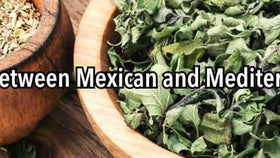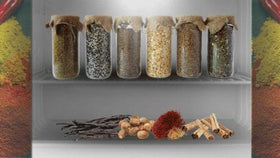Vanilla Beans vs. Artificial Vanilla - The Ethics and Value in Supporting Real Vanilla
Why Choosing Real Vanilla vs. Artificial Vanilla is the Right Choice:
The enchanting allure of vanilla, synonymous with warmth and delightful sweetness, effortlessly elevates many of the world's favorite baked goods and sweet treats. Vanilla firmly holds its position as a favorite among chefs, bakers, perfumers, flavor manufactures, and many others. However, in a world of rising cost and inflation there's an intersection of taste, ethics, and value, and a pivotal choice emerges: real vanilla beans or artificial vanilla? In this article, we dive into not only the nuanced world of flavors but also the profound impact our own buying choices in vanilla products have on global farming communities and environments.
While the allure of real vanilla beans is unmistakable, many often wonder about the tangible benefits of real vanilla compared to its artificial counterpart.
Vanilla beans, the cured precious pods that come only from the vanilla orchid, carry within them a complex bouquet of flavors and provide a culinary experience that artificial substitutes can not mirror. Originating from the delicate vanilla orchid, real vanilla beans take us on a sensorial journey, where each pod narrates a tale of rich, multi-faceted flavors that starts from a small place or village that many of us have perhaps never even heard of. Yet even in the most remote areas of the world, small scale farms and communities engage in some of the most ethical practices to produce the world's beloved vanilla.
When you choose real vanilla beans, you're supporting small-scale farmers from places like Madagascar, Uganda, and Tahiti. These locations, where vanilla cultivation is often the bedrock of their local economies, present a poignant narrative of tradition, resilience, and a delicate balance with nature.
The Ethical Dimension: Choosing Real Vanilla Supports Small Communities and Sustainability.
Opting for real vanilla beans is synonymous with endorsing the vitality and sustainability of small farming communities. By choosing genuine vanilla beans, we ensure that our consumption sustains families and fortifies local industries, acting as a buffer against the capriciousness of global market trends. This choice intertwines our culinary practices with a mindful approach to supporting traditional farming practices and inhibiting the prevalence of exploitative labor that occasionally shadows larger agricultural ventures.
Vanilla in most regions of the world is grown using a very balanced approach to supporting the needs of small communities with limited resources and also respecting the natural environment in which one lives. For instance, in Madagascar, the world's largest vanilla growing region, agroforestry is how vanilla is grown.
What is agroforestry? Agroforestry in vanilla refers to the specific practice of using an integrated approach to agriculture that strategically combines crops, trees, and sometimes even animal farming to create a sustainable farming system. This methodology offers social, economic, and environmental benefits by optimizing the use of land and promoting diverse farming practices.

Agroforestry in Vanilla Production Encompasses the Following Aspects:
Shade-Growing
Vanilla Vines grown under shade tree canopy: Vanilla, originating from the understory of humid tropical forests, naturally prefers shade. Vanilla vines are often grown under the canopy of other trees, which protect them from direct sunlight and provide natural mulch and organic matter through fallen leaves.
Intercropping
Vanilla beans may be cultivated alongside various other crops like coffee, cocoa, pepper, or fruit trees. This not only optimizes land use but also ensures that farmers have multiple sources of income, reducing dependence on a single crop. Intercropping can reduce pests and diseases by disrupting the habitat for pest organisms, sometimes eradicating the need for chemical pest control.
Sustainability and Soil Health
Tree roots stabilize the soil, reducing erosion and maintaining soil health, which is particularly vital for the delicate vanilla orchids.
Nutrient Cycling
The inclusion of various plants ensures a continuous cycle of nutrient use and replenishment within the soil, often minimizing and eliminating the need for synthetic fertilizers. As vanilla vines are interwoven into the existing forest the use of fertilizers and pesticides in not used in Madagascar, Uganda and most countries that practice non evasive and non industrial means of farming.
Climate Resilience
Diverse Ecosystems, Establishing a multifaceted ecosystem can safeguard against the vulnerabilities associated with monoculture farming, particularly in the face of climate change. Mitigating Risks Diversification through agroforestry can mitigate risks associated with market fluctuation, crop failure, or price volatility.
Social and Economic Impacts
Stable Income, by involving multiple crops, farmers are not solely reliant on the success of vanilla beans each season, providing more stable and diversified income sources. Generally crops such as Cocoa, cinnamon and even honey are used to help diversify income streams and opportunities for communities.
Community Development Sustainable practices like agroforestry often translate into community development, preserving traditional farming practices, and promoting social sustainability.
Environmental Conservation
Biodiversity, the introduction of various crops and trees enhances biodiversity, fostering a balanced and healthy ecosystem.
In the context of vanilla production, agroforestry is not only a strategic choice for maximizing yield and ensuring economic stability but also resonates with the principles of sustainability and environmental conservation. Through well-planned agroforestry, vanilla farmers can enhance productivity, safeguard biodiversity, and fortify against the socio-economic vulnerabilities inherent in mono-cropping systems.
More information on agroforestry in Madagascar can be found here
While the intricate and sustainable practices of agroforestry underscore the deep-rooted benefits of natural vanilla cultivation, it's crucial to also understand the other side of the spectrum. As the demand for vanilla continues to rise, the flavor market has introduced a more cost-efficient alternatives to meet the needs of mass production – artificial vanilla. Let's discuss what this alternative entails and its implications in the broader context of consumption and ethics.
Artificial Vanilla: A Cost-Effective Alternative with Ethical Considerations
On the other hand, artificial vanilla, primarily constituted of synthesized vanillin, provides a more accessible and cost-effective alternative. While it permeates many commercial products, artificial vanilla, with its simpler and somewhat less intricate flavor profile, might miss the profound depth offered by real vanilla beans.
The creation of artificial vanilla, often anchored in petrochemical usage, not only raises ethical questions regarding environmental impact but also fosters a disconnect between consumers and the natural, holistic origin of their flavors.
Have you ever looked at a carton of ice cream and noticed the terms natural and artificial vanilla flavor? If so, then you most likely unknowingly using artificial vanilla. Other products such as vanilla flavoring contain artificial vanilla. To find out if you are using artificial vanilla, simply read the ingredient list of products you consume.
Nurturing Ethical and Sustainable Choices with Vanilla Beans
Choosing real vanilla beans is not merely a gastronomic decision but an ethical commitment, underlining a conscious consumerism that echoes with several principles of a more holistic approach for both businesses and consumers.
Upholding Sustainable Farming:
Our affinity for vanilla beans inherently supports sustainable and ethical farming practices, promoting an environmentally and socially conscious approach to agriculture where communities maintain not only their vanilla vines but the overall well-being of their local forestry through use of agroforestry.
Empowering Communities:
The preference for real vanilla beans circulates profits within farming communities, reinforcing their economic stability and enabling avenues for sustainable local development. These investments contribute to greater well-being of the communities through investments in infrastructure that improves the lives. Areas for improvement include but are not limited to development of water wells, solar power, medical supplies, books, schools, teachers etc.
Conserving Biodiversity:
By fostering a demand for real vanilla beans, we indirectly contribute to safeguarding agricultural biodiversity and preserving the heritage of various vanilla species.
The journey from vanilla beans to our tables is not simply a culinary transition, but a narrative that is intricately woven with ethics, sustainability, and community support. By choosing real vanilla beans, we cherish not only the authenticity of flavors in our delicacies but also uphold the labor, tradition, and ethical practices that are enshrined in every single bean.
Our hope is by supporting real vanilla over artificial vanilla we let vanilla beans narrate a tale where ethics, flavor, and mindful consumption harmoniously coalesce, connecting us with distant communities and their timeless traditions. Choosing real vanilla may not always be the most economical choice but by far and wide it is the right choice for you, your family, and the families that have grown and provided vanilla beans to the world for generations.







Slofoodgroup
Autor